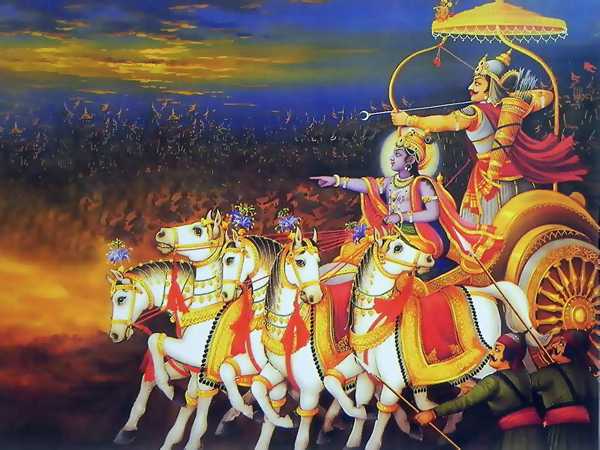Chapter 62

Sanjaya said, “All those kings, possessed of arms that resembled spikedbludgeons, then proceeded towards their tents, filled with joy andblowing their conchs on their way. The Pandavas also, O monarch,proceeded towards our encampment. The great bowman Yuyutsu followed them,as also Satyaki, and Dhrishtadyumna, and Shikhandi, and the five sons ofDraupadi. The other great bowmen also proceeded towards our tents. TheParthas then entered the tent of Duryodhana, shorn of its splendours andreft of its lord and looking like an arena of amusement after it has beendeserted by spectators. Indeed, that pavilion looked like a city reft offestivities, or a lake without its elephant. It then swarmed with womenand eunuchs and certain aged counsellors. Duryodhana and other heroes,attired in robes dyed in yellow, formerly used, O king, to waitreverentially, with joined hands, on those old counsellors.
Arrived at the pavilion of the Kuru king, the Pandavas, those foremost ofcar-warriors, O monarch, dismounted from their cars. At that time, alwaysengaged, O bull of Bharata’s race, in the good of his friend, Keshava,addressed the wielder of gandiva, saying, “Take down thy gandiva as alsothe two inexhaustible quivers. I shall dismount after thee, O best of theBharatas! Get thee down, for this is for thy good, O sinless one!”
Pandu’s brave son Dhananjaya did as he was directed. The intelligentKrishna, abandoning the reins of the steeds, then dismounted from the carof Dhananjaya. After the high-souled Lord of all creatures had dismountedfrom that car, the celestial Ape that topped the mantle of Arjuna’svehicle, disappeared there and then. The top of the vehicle, which hadbefore been burnt by Drona and Karna with their celestial weapons,quickly blazed forth to ashes, O king, without any visible fire havingbeen in sight. Indeed, the car of Dhananjaya, with its quick pairs ofsteeds, yoke, and shaft, fell down, reduced to ashes.
Beholding the vehicle thus reduced to ashes, O lord, the sons of Pandubecame filled with wonder, and Arjuna, O king, having saluted Krishna andbowed unto him, said these words, with joined hands and in anaffectionate voice, ‘O Govinda, O divine one, for what reason hath thiscar been consumed by fire? What is this highly wonderful incident thathas happened before our eyes! O thou of mighty arms, if thou thinkestthat I can listen to it without harm, then tell me everything.’
Vasudeva said, ‘That car, O Arjuna, had before been consumed by diversekinds of weapons. It was because I had sat upon it during battle that itdid not fall into pieces, O scorcher of foes! Previously consumed by theenergy of brahmastra, it has been reduced to ashes upon my abandoning itafter attainment by thee of thy objects!’
Then, with a little pride, that slayer of foes, the divine Keshava,embracing king Yudhishthira, said unto him, ‘By good luck, thou hast wonthe victory, O son of Kunti! By good luck, thy foes have been vanquished!By good luck, the wielder of gandiva, Bhimasena the son of Pandu,thyself, O king, and the two sons of Madri have escaped with life fromthis battle so destructive of heroes, and have escaped after having slainall your foes! Quickly do that, O Bharata, which should now be done bythee!
After I had arrived at Upaplavya, thyself, approaching me, with thewielder of gandiva in thy company, gavest me honey and the customaryingredients, and saidst these words, O Lord: ‘This Dhananjaya, O Krishna,is thy brother and friend! He should, therefore, be protected by thee inall dangers!’ After thou didst say these words, I answered thee, saying,’So be it!’
That Savyasaci hath been protected by me. Victory also hath been thine, Oking! With his brothers, O king of kings, that hero of true prowess hathcome out of this dreadful battle, so destructive of heroes, with life!’Thus addressed by Krishna, King Yudhishthira the just, with hair standingon end, O monarch, said these words unto Janardana:
Yudhishthira said, “Who else save thee, O grinder of foes, not exceptingthe thunder-wielding Purandara himself, could have withstood thebrahmastras hurled by Drona and Karna! It was through thy grace that thesamsaptakas were vanquished! It was through thy grace that Partha hadnever to turn back from even the fiercest of encounters! Similarly, itwas through thy grace, O mighty-armed one, that I myself, with myposterity, have, by accomplishing diverse acts one after another,obtained the auspicious end of prowess and energy! At Upaplavya, thegreat rishi Krishna-Dvaipayana told me that thither is Krishna whererighteousness is, and thither is victory where Krishna is!'”
Sanjaya continued, “After this conversation, those heroes entered thyencampment and obtained the military chest, many jewels, and much wealth.And they also obtained silver and gold and gems and pearls and manycostly ornaments and blankets and skins, and innumerable slaves male andfemale, and many other things necessary for sovereignty. Having obtainedthat inexhaustible wealth belonging to thee, O bull of Bharata’s race,those highly blessed ones, whose foe had been slain, uttered loud criesof exultation. Having unyoked their animals, the Pandavas and Satyakiremained there awhile for resting themselves.
Then Vasudeva of great renown said, ‘We should, as an initiatory act ofblessedness, remain out of the camp for this night.’ Answering, ‘So beit!’ the Pandavas and Satyaki, accompanied by Vasudeva, went out of thecamp for the sake of doing that which was regarded as an auspicious act.Arrived on the banks of the sacred stream Oghavati, O king, the Pandavas,reft of foes, took up their quarters there for that night!
They despatched Keshava of Yadu’s race to Hastinapura. Vasudeva of greatprowess, causing Daruka to get upon his car, proceeded very quickly tothat place where the royal son of Ambika was. While about to start on hiscar having Shaibya and Sugriva (and the others) yoked unto it, (thePandavas) said unto him, ‘Comfort the helpless Gandhari who hath lost allher sons!’ Thus addressed by the Pandavas, that chief of the Satvatasthen proceeded towards Hastinapura and arrived at the presence ofGandhari who had lost all her sons in the war.'”




